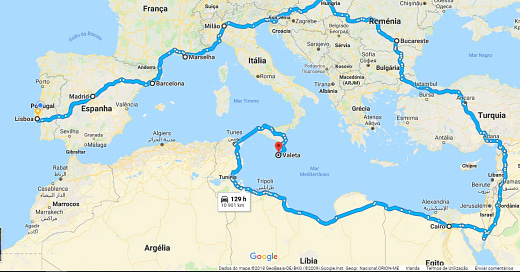How to say "books" in Arabic (and Old English)
In the previous issue, we travelled from Lisbon to Bucharest aboard the word "books". This time around, we're heading to the other side of the Mediterranean...
Changing vowels
After discovering how to create the plural of “book” in many Latin languages, let's move on to the other side of the sea and discover how to say "books" in Arabic. The simple form of "book" is "kitāb". And the plural? It’s "kutub." That's right: in Arabic, plural may be marked by changing all the vowels inside the word.
The definite article is "al" (which we also find in “Algarve”, meaning “the West”, for example) and so "the book" will be "al-kitāb". "The books" is translated as "al-kutub".
However, this is not the full story. Besides singular and plural, Arabic words also have a dual form. Thus, when we speak of two books, the correct form will be "kitābayn".
Grammatical debris
We have already been to the other side of the Mediterranean — where we could also look at other very interesting languages. We will leave them for another day. Now, let’s go back out to sea in the direction of Malta.
Maltese, one of the official languages of the European Union, is related to Arabic. This fact explains why "book" in Maltese is "ktieb". And in the plural? Here it is: "kotba".
While we're in Malta, let's look at English, which is also official in this small country. The word "book" was, in Old English, "bōc". The plural went like this: "bēċ".
In other words, the plural was also marked by vowel changes in the middle of the word, just like in Arabic. Today, the word "book" becomes "books" in the plural — but there are some words where we can still find this old plural. "Goose" becomes "geese" and "foot" becomes "feet". These are grammatical debris from earlier stages of English.
Smoothing out language
Some people seem to regard the grammar of a language as made of stone: it is so because it has always been so.
This is not how languages work.
Grammars change — inevitably. Some regularities fall apart (the Old English plural) while others appear, not completely replacing the old ones (plural -s, for example). The result is a specific set of rules and exceptions that is the very stuff of grammar.
A curious interplay between rules and exceptions is seen in the way children apply general rules to irregular words. Thus, in the case of English, a child may say "gooses" before learning the correct form is "geese". The child’s mind absorbs first what is systematic and only then what is irregular.
If, by chance, the irregularity happens to be found in a rare word, it may tend to disappear — at some point, speakers forget that there was something different there and simply apply the general rule, smoothing out that wrinkle in the grammar.
Exceptions strike back
Ah, but irregularity is always around the corner! From time to time, because speakers are not robots and always use language in unpredictable ways, a rule starts to get shakier and exceptions arise in everyday use.
Some of those new grammar wrinkles disappear, crushed by the force of the general rule. But some begin to spread and, suddenly, we have exceptions to the general rule. Some of those exceptions even manage to become a new rule.
I imagine that this was the process that led the "s" at the end of Portuguese syllables to be read — in a perfectly regular way today — in three different forms, as described in the previous issue.
Then there are those cases — as we’ve seen when talking about Balkan languages — where grammatical rules jump from language to language, spreading across an entire region.
It is a complex game, which goes on for centuries without anyone controlling it or even consciously noticing it (apart those irritations caused by small changes).
Language is complex, used by everyone, but in such a way that most of us don’t notice its inner workings. That’s why it is such a fertile ground for myths and exaggerations — but also a source of wonder when we do notice how it works.
See you next week!
I’m thinking of changing the title of this newsletter. Could you help me decide? Thanks so much!




